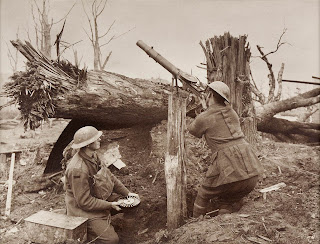New Media platforms are analyzed often enough from the perspective of child development, commerce, and psychology. While all thee perspectives may well yield valuable insights, treading where others have trod is unlikely to prove either fruitful or timely. In the time I wrote this sentence, another sixteen-year-old with an app was probably bought out by an angel investor.
Rather than inveighing for or against social networks, I will make a claim that one can use the tools of rhetorical analysis—even some postmodern ones, though sometimes those tools can be a bit like using a power drill when a wrench would have done—to analyze what social networks are and how we can more usefully envision them.
If you were born after the release of "
Smells Like Teen Spirit," then I'm not sure I'd consider you to be of the same generation as myself. Anyone who has a smart phone in high school, a Facebook account without a university address, or who has never used a hardbound encyclopedia is perhaps ill-equipped to examine, much less question, online media tools as such. No wonder premature nostalgia for the early '90s abounds (just try shopping without running into Doc Marten boots and ill-fitting tops; it's horrifying)—there's a vague idea that this era was more authentic, more individual, and less polite.
According to
Saussure, an idea, a
sign can be broken into its
signifier (say, the word
blog, a rather unfelicitous chopping off of
weblog) and the
signified (the "actual" blog itself, whether you treat that as a series of 0s and 1s or its realized presence). I think this is an incredibly useful application for an old idea which struck me as academic at the time:
a blog is just a configuration of electrons. You and I are ultimately protons and electrons. What is media? On one level, "
it is such stuff as dreams are made on:" ephemeral and hosted on a server, perhaps in Iceland where it's cold and there's geothermal heating.
But looking at the signified—what we talk about when we talk about the Internet—is more interesting. I would argue that the new media are made up of and therefore are the playing out of social ritual. Really, the critical toolbox we should be throwing at the likes of Facebook is that of the anthropologist. Seen as a realization of mating rituals, scratch-my-back-I'll-scratch yours rites, and (of course) social posturing, maybe the hysteria of media agnostics and the evangelism of media millennialists could cool down a notch. (I say "agnostic," because presumably media atheists are out fly fishing or preaching Mormonism or hunting down Osama.)
Here's a
map of the U.S. according to Facebook connections. Only the deluded or deeply eccentric have never met those on their social network: who's to say a guy I met on a plane isn't better suited to my confidence than whomever I happen to live by or work with?
There's a certain beauty to the idea that every line is not just 1s and 0s but two people who know and like each other. I'm reminded of corporeal metaphors: on Vronsky's horse in
Anna Karenina,
the muscles stood up sharply under the network of sinews, covered with this delicate, mobile skin, soft as satin, and they were hard a bone.
Neurons "network" to make a brain. Media is as real as anything intangible, whether philosophy, your FDIC deposit insurance, or love. Human beings have never lived entirely in the realm of the tangible. The very act of
language makes real the unreal: it
always points to something else (arbitrarily, as anyone who has studied a foreign language knows).
Language, the
cracked kettles for bears to dance to, is no better, no worse, neither more alive nor more dead, than at any other time in human history. Social networks both
use language and
constitute a language of their own. Specific platforms may go the way of engraved tablets and Kurt Cobain, but human communication and connection will endure.


















.JPG)



